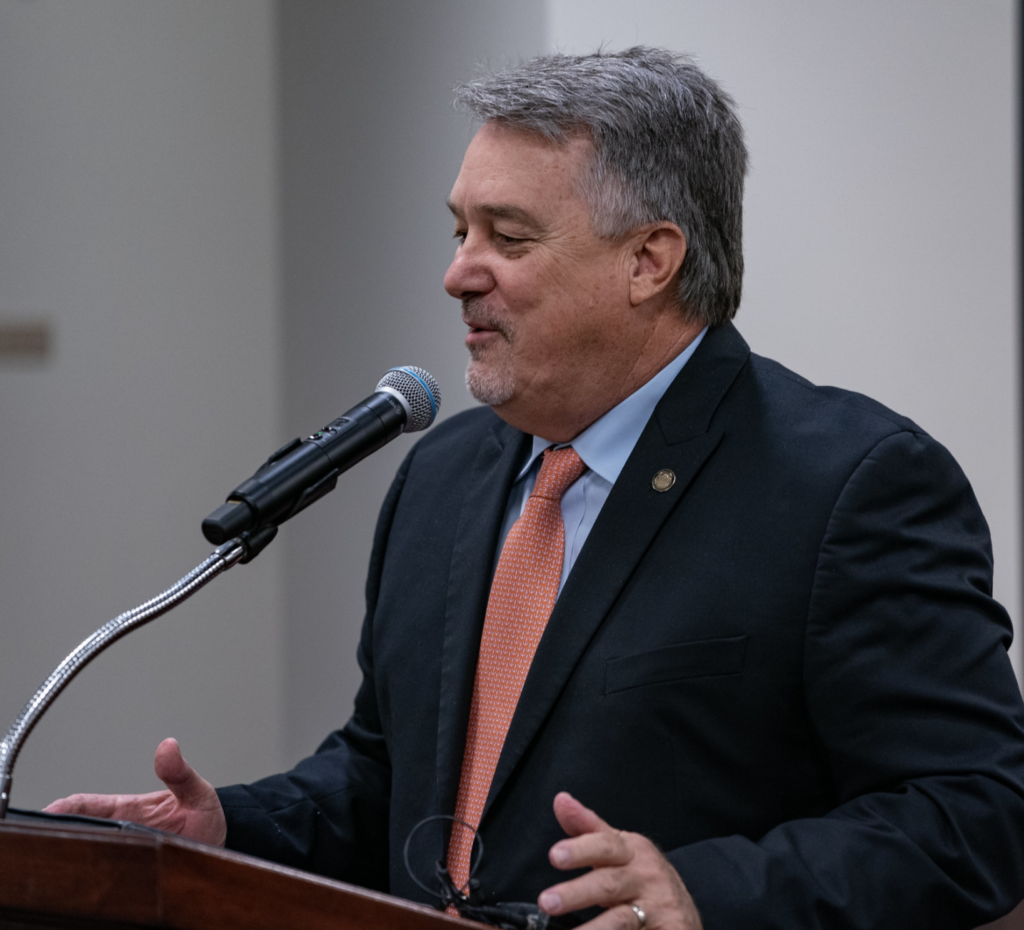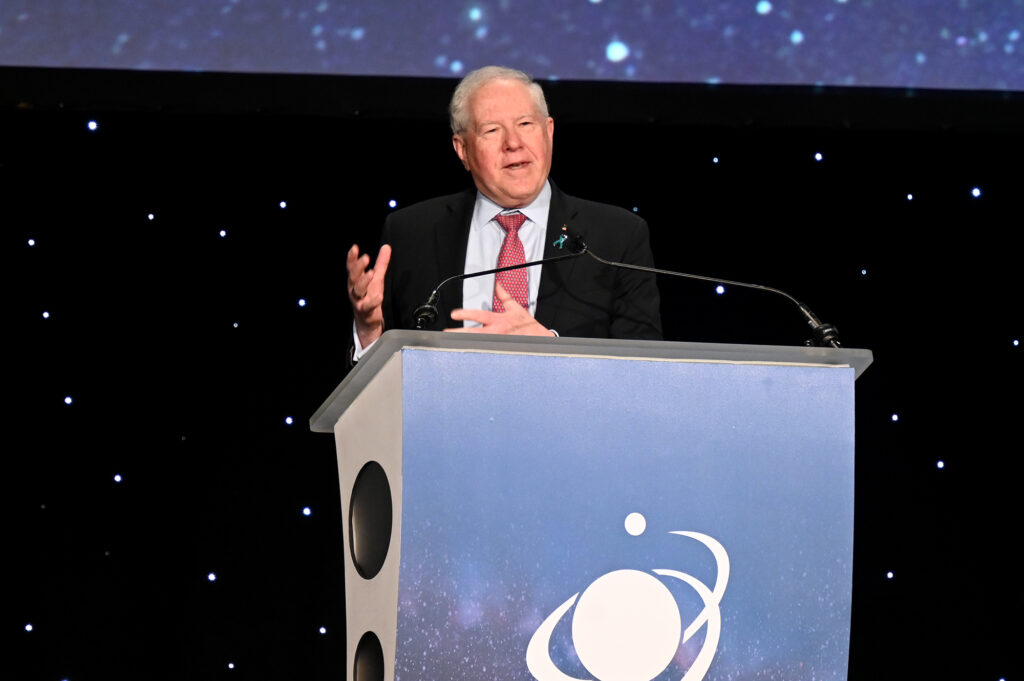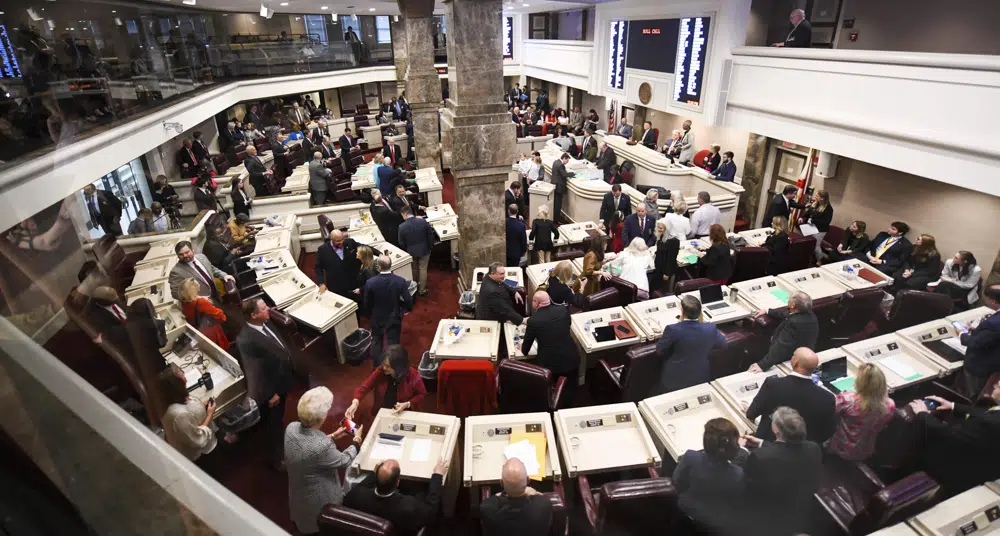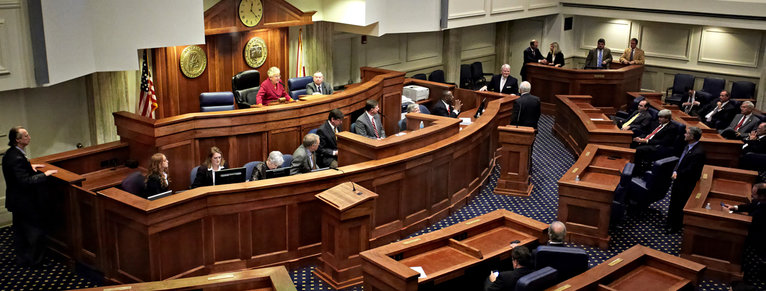Rosa Parks statue for Alabama State Capitol grounds gets final approval

Alander Rocha, Alabama Reflector The Alabama Women’s Tribute Statue Commission Friday approved the final design for a statue of Rosa Parks statue that will sit near the entrance of the Alabama State Capitol. Several members of the commission traveled to sculptor Julia Knight’s studio in Decatur, Georgia to see the working model of the statue of the civil rights icon. Knight said that designing the statue has been a “labor of love.” “I am feeling a little tired, but I’m also feeling a little sad that now I’m going to let go of Rosa,” Knight said. Commission members, present both in Georgia and virtually, praised the 15-foot model of the statue. It shows Parks stepping up on a raised platform, looking forward with her coat blowing in the wind. She will face South Bainbridge St. at an angle towards the steps leading up to the Capitol, allowing visitors to see her as they walk up. Parks will be the first woman depicted on the Alabama State Capitol grounds. Tracy Morant Adams, a Birmingham banker and member of the commission, said the statue captures Parks’ determination. “When you look at [her braid], it is very detailed in the back, and then also the momentum, the movement of the coat of the cult shows progression. I think that you capture that quite well,” she said. Annie Butrus, a Birmingham-based painter and member of the commission who attended the meeting virtually, said that Knight accomplished “a nearly impossible feat of creating this incredibly powerful yet delicate” design. “I love the way you’ve modeled her feet; that really shows the strength and the determination, and the absolute assurance of where she was heading,” Butrus added. Adams agreed. “Just from looking here — it seems absolutely beautiful and you’re right, Annie, regarding her stance — her feet so firmly planted with so much power. I see power there. It’s beautiful,” Adams said. The commission is also tasked with erecting a Helen Keller statue on the Capitol grounds. The Keller statue will be to the left of the back entrance, facing the current statehouse. That building is expected to be demolished after a new statehouse is completed sometime in the next three years. It is expected to be replaced by green space. The statues are expected to cost about $611,000. The commission has raised about $700,000 for the statues. Remaining money will pay for any additional costs. The Parks statue was funded in part by a $300,000 grant from the Alabama Power Foundation. The grant cannot be used for the Keller statue but will likely be used for ongoing maintenance on the Parks’ statue. Funding for the Keller statue, expected to cost almost $300,000 ($245,000 for the sculptor and $50,000 for site preparation), was not clear earlier this year. In the spring, the Alabama Legislature approved HB 125, a supplemental appropriations bill sponsored by Rep. Rex Reynolds, R-Huntsville, and spearheaded by Hall that allocated $200,000 towards the Keller statue. The commission is also accepting donations for the statue. Parks, a longtime civil rights activist, was arrested on Dec. 1, 1955, for refusing to give up her seat to a white passenger. Parks’ arrest led to the Montgomery Bus Boycott, considered the start of the modern civil rights movement. Montgomery’s Court Square, where Parks caught the bus on Dec. 1, 1955, features a life-size statue of Parks. A statue of Parks also resides in the U.S. Capitol. The Alabama Women’s Tribute Statue Commission was formed in 2019 to plan and erect statues of Rosa Parks and Helen Keller on the grounds of the Alabama State Capitol. The commission consists of six members and is chaired by Rep. Laura Hall, D-Huntsville. The statue will be cast at a foundry, which could take six months to complete the statue. It could be unveiled by the middle of next year, though it is not known when it will be ready for installation. “She is going to just be this beacon of feminine strength. It’s just great,” said Butrus. Alabama Reflector is part of States Newsroom, a network of news bureaus supported by grants and a coalition of donors as a 501c(3) public charity. Alabama Reflector maintains editorial independence. Follow Alabama Reflector on Facebook and Twitter.
Alabama county commissions plan mental health push in 2024 legislative session

Ralph Chapoco, Alabama Reflector AUBURN – The Association of County Commissions of Alabama plans to make a push on mental health issues in the 2024 session of the Alabama Legislature. The organization, holding its annual meeting in Auburn this week, plans to support expansion of residential treatment facilities; improved training for corrections officers on mental health crises; additional funding for a 988-suicide hotline, and 15 more mental health crisis units. “In most counties, we are unable to respond to that cry out for help because there are no beds for treatment for those persons,” said Sonny Brasfield, executive director of the ACCA, on Wednesday. Brasfield said in many cases, families will first approach a local probate judge to get help for a loved one in a mental health crisis. “The probate judge faces himself, saying ‘gosh, yes, this person needs to be committed,’” Brasfield said. ‘“I have nowhere for the person to go. I will put him in line, take him back home.’” If that person develops additional problems, Brasfield said, a family may end up calling law enforcement, which places the person in a detention center, which could worsen the issues. ACCA set a goal to add 3,200 additional beds for those going through a mental health crisis that will require an additional $30 million. “We begin that effort today,” Brasfield said. “And tomorrow, we are setting that as our goal.” The ACCA held two sessions on mental health at a meeting on Wednesday. The first presentation was given by Monroe County Commissioner Justin Sawyer, who was part of an effort by second-term commissioners who reviewed potential issues they wanted to address. The group, the PLAN 2024 Leadership Program, decided to make mental health a priority. “We unanimously said we wanted to tackle mental health, but when we said it, we really didn’t know what to do,” Sawyer said. Members of the group surveyed probate judges for their thoughts. According to a handout passed out to participants on Wednesday, 92% of the judges in the different counties wanted more long-term care options and resources. 72% wanted better non-residential services and programs, and 61% of those surveyed wanted to expand involuntary commitment authority. Many of the judges said they conducted mental health hearings at least days of the week. From there, the group developed the priority list, which included better access to long-term care, expanded mental health training for employers and law enforcement, as well as increasing the number of mental health officers, placing one in all 67 counties. Rep. Rex Reynolds, R-Huntsville, who chairs the House Ways and Means General Fund Committee, followed and spoke of efforts to fund the 988 hotline during the prior year’s session. “That really was to take care of the operations of the projected six crisis centers in Alabama,” Reynolds said. The bill would have funded the 988 line through a surcharge on cell phone lines. The proposal drew opposition from the telecommunications industry, and ultimately did not pass. Reynolds said he plans to file the bill again in next year’s session. The ACCA meeting will continue on Thursday. Alabama Reflector is part of States Newsroom, a network of news bureaus supported by grants and a coalition of donors as a 501c(3) public charity. Alabama Reflector maintains editorial independence. Follow Alabama Reflector on Facebook and Twitter.
Organizations make their pitches for Alabama opioid settlement money

Ralph Chapoco, Alabama Reflector Lawmakers and public officials heard proposals from different organizations Thursday for spending grant money from the state’s share of a national opioid settlement agreement. Fourteen groups made their pitch for funding to members of the Oversight Commission on Opioid Settlement Funds during Thursday’s meeting, hoping to secure a grant from the estimated $249 million that Alabama is expected to receive. “If you will recall, the Legislature, House, and Senate, passed the first allocation of funds, which was $10 million, $1.5 million of that went to the prisons, the ADOC,” said Rep. Rex Reynolds, R-Huntsville, the chair of the committee. “The other $8.5 million, which is what you will hear about today.” The proposals included treatment services and prevention measures, fentanyl detection, and veteran support. The funding came from a settlement between the state and companies who have been largely blamed for precipitating the crisis in which thousands of people, spread across the nation, have become addicted to painkillers and other opioids, about $21 billion spread out over the next 18 years, based on the 2021 settlement. State Opioid Coordinator Debbi Metzger said there are three waves to the opioid epidemic. “The first is the overprescribing of very potent prescription opioids to individuals,” she said. “Alabama was number one in the nation for many years, and as a result of that, the overprescribing led to numbers in overdoses like we had never seen before.” The second wave of opioid deaths happened in 2010 when heroin use increased. That was followed by a third wave that began in 2013 with the rise of synthetic opioids. Alabama’s death rate from drug overdoses was 30.1 per 100,000 people in 2021, according to the Centers for Disease Control and Prevention. The rate of death from opioid overdoses was 21.2 per 100,000, according to KFF. Kimberly Boswell, commissioner of the Alabama Department of Mental Health, said grants may be awarded based on prevention, treatment, and recovery support. Prevention grants have no limitations because “anyone may be affected by substances at many points in their lifetime,” Boswell said. Most of the money will be directed toward treatment, with almost $6 million of the allocation going toward firms that specialize in that area. Those who specialize in prevention will receive 20% of the money, followed by recovery services at 10%. Applicants came from different areas. His Way Ministries and New Life for Women are treatment centers, which helps clients with addictions were two of the companies who presented at the committee and will likely submit a request for proposal for grant funding. The amount was not disclosed at the meeting. The window to apply for funding that includes specific projects began Friday. “We have served over 1,000 men and their families, and have graduated 500 into a life of recovery through a nine-month extensive recovery program,” said Tom Reynolds, director of ministry for His Way Ministries, based in the Huntsville area. “We have consistently exceeded a 90% graduation rate in our 16 years.” Others, such as the Military Officers Association, said that the Alabama Department of Mental Health has spent $40 million per year for the Alabama Opioid Overdose and Addiction Council, but nothing has been allocated specifically for veterans and their families. “Suffice it to say, our state is not meeting the needs of our servicemen and women,” said Jerry Steele, who leads the Alabama chapter of the Military Officers Association. Sunray, a Huntsville company, sought money for the development of a machine that detected fentanyl placed within containers. “This device could be used in a prison walking through the screener,” said Steve Schmidt, who is listed as the agent for the company. “It can be used in a mailroom. It can be used in Montgomery to screen every piece of mail that comes in.” Companies may submit their requests for proposals at the Department of Mental Health’s website. Officials will begin reviewing and evaluating the proposals throughout December, and the committee will meet in January to recommend awards. “You look at the resources, and the multiple ways that opioid addiction is impacting our life,” said Cam Ward, Director of the Alabama Bureau of Pardons and Paroles. “I talk about it from the criminal justice side, but you heard someone talk about how it is impacting services and other agencies.” Alabama Reflector is part of States Newsroom, a network of news bureaus supported by grants and a coalition of donors as a 501c(3) public charity. Alabama Reflector maintains editorial independence. Follow Alabama Reflector on Facebook and Twitter.
Steve Flowers: Annual legislative session successful

The recently completed Regular Session of the Alabama legislature was a success. It began on a high note and ended positively. Why? There was plenty of money to spend. Both the General Fund Budget and the Education Budget had historic amounts of money. Most of the focus of the Session was on budgeting, as it should be, because that is the only constitutional mandate that the legislature is tasked with in the 105-day Regular Session. Gov. Kay Ivey laid out her agenda in her State of the State address, then sent her proposed budget requests over to the legislature. The governor’s speech outlining her legislative agenda was about doing good things for education. However, her desires were vague, and her ask list was long and wishful, like a kid’s Christmas wish list. It called for the state to give away the store. It was as though she was running for reelection, which everyone knows she cannot do. Therefore, the veteran Senate treats her politely but has relegated her to a lame-duck status. The legislature has taken total control of the budgeting process, as they should do under the Constitution. The governor proposes, and the legislature disposes. The days of a strong-armed, powerful, omnipotent governor that controls both the Executive and Legislative Branches are over. The King George Wallace era is gone, probably forever. The surplus in the Education Budget was enormous. How to spend this surplus became the focus of the entire session. There is a very accurate political assessment that it is much more difficult to deal with a surplus budget than a lean or deficit budget. George Wallace told me about this same thing during his last term as governor when I was a freshman legislator. Accolades go out to Senator Arthur Orr (R-Decatur), Chairman of the Senate Education Finance and Taxation Committee, and Representative Danny Garrett (R-Trussville), Chairman of the House Education Ways and Means Committee. These two gentlemen essentially singlehandedly wrote the Education Budget and did a masterful job. They were cognizant that what goes up has to come down. Therefore, they created several savings accounts and rainy day funds for the rainy days ahead because they will come. The Education Budget was an historic $11.5 billion. It gave increases for pre-kindergarten programs, school supplies, school nurses, and a significant 2% cost of living salary increase to teachers and support personnel. All colleges and universities in the state received increased funding. Non-education entities were given money. There was $100 million for prison education. The high-profile aspects of the Education Budget windfall were a one-time rebate going back to taxpayers in November. Governor Ivey had wished for a $400 per person and $800 per couple rebate. However, the final result is $150 per person and $300 per married couple. Most legislators preferred eliminating the grocery tax or long-term tax cuts to this one-time check back in November. The surprise in the Christmas stocking from the Education Budget surplus is the reduction on the state sales tax on groceries. Eliminating or reducing the state tax on groceries has been championed by Democrats for years, as the tax is regressive and hurts the state’s lowest income earners the hardest. However, the measure garnered Republican bipartisan support this year after 20 years and passed with an overwhelming vote in both Chambers. It is, however, a gradual reduction. The grocery tax would decrease 2% in two steps, with the tax being reduced 1% this year and another 1% percent new year, if the funds are available. The State General Fund had a good year as well. The $3 billion General Fund was record-shattering—the largest in history. The Chairmen, Senator Greg Albritton (R-Escambia) and Representative Rex Reynolds (R-Huntsville) oversaw a $159 million increase over the current year. The largest increases in the budget were in Medicaid by $69 million and Corrections by $59 million more. State employees will see a 2% increase in pay, which will go into effect as the new fiscal year begins October 1. The legendary head of the Alabama State Employees Association, Mac McArthur, has quietly garnered state employees a cost of living raise five out of the last six years. See you next week. Steve Flowers is Alabama’s leading political commentator. His weekly column appears in over 60 Alabama newspapers. He served 16 years in the state legislature. Steve may be reached at www.steveflowers.us.
Public meetings on congressional redistricting announced

On Wednesday, State Sen. Steve Livingston (R-Scottsboro) and State Rep. Chris Pringle (R-Mobile), who serve as the joint chairs of the Permanent Legislative Committee on Reapportionment, announced a series of meetings and deadlines on the looming congressional redistricting. The first meeting will be on June 27 at 1:30 P.M. in the Alabama State House Room 200. This will be a meeting of the Joint Committee and a public hearing. People unable to attend can watch the proceedings online at the Legislature’s website. July 7 at 5:00 P.M. is the deadline for all plans to be submitted to the Reapportionment Committee. You can contact the committee directly by email at: district@alsenate.gov. The committee will meet again and hold a public hearing on July 13 at 1:30 P.M. in State House Room 200. On August 14, there will be a hearing at Hugo L. Black United States Courthouse in Birmingham. The House members serving on the Permanent Legislative Committee on Reapportionment members include Cynthia Almond (R-Tuscaloosa); Barbara Boyd (D-Anniston); Jim Carns (R-Birmingham); Steve Clouse (R-Ozark); Corley Ellis (R-Columbiana); Chris England (D-Tuscaloosa; Laura Hall (D-Huntsville); Sam Jones (D-Mobile); Joe Lovvorn (R-Auburn); and Rex Reynolds (R-Huntsville). In 2022 a three-judge panel of the Eleventh Circuit Court of Appeals rejected Alabama’s 2021 congressional redistricting as being in violation of the Voting Rights Act of 1965—the U.S. Supreme Court, which earlier this month agreed. The three-judge panel has given the Legislature until the middle of next month to submit a new congressional redistricting plan to the federal court. The three-judge panel has ordered the Legislature to submit a new map with two majority-minority districts or something as close to that as possible. Alabama Governor Kay Ivey is expected to call a special session no later than July 17 to attempt to comply with the court order. If the Legislature cannot reach an agreement on a redistricting plan by July 21, or the Court does not like the State’s plan, then the three-judge panel may appoint a special master to draw the districts for the State. Republicans currently control six of Alabama’s congressional seats, while Democrats control only the Seventh Congressional District. None of the seven congressional races were competitive during last year’s general election. The redistricting could make two of those districts winnable for Alabama Democrats. It could also cost Democrats a seat if they make it too competitive. To connect with the author of this story or to comment, email brandonmreporter@gmail.com.
Nathaniel Ledbetter announces appointments to the Reapportionment Committee

On Tuesday, Speaker of the House Nathaniel Ledbetter announced that he had appointed a number of House members to serve on the Permanent Legislative Committee on Reapportionment. The House members appointed are: Cynthia Almond (R-Tuscaloosa) Barbara Boyd (D-Anniston) Jim Carns (R-Birmingham) Steve Clouse (R-Ozark) Corley Ellis (R-Columbiana) Chris England (D-Tuscaloosa) Laura Hall (D-Huntsville) Sam Jones (D-Mobile) Joe Lovvorn (R-Auburn) Chris Pringle (R-Mobile) Rex Reynolds (R-Huntsville). Since this is a joint committee, it is also made up of members of the Senate. The appointment of 11 members from the House would indicate an expansion of the committee. According to the committee website, the joint committee has just six members: Sens. Steve Livingston, Dan Roberts, and Bobby Singleton, and Reps. Kyle South, Laura Hall, and Chris Pringle. South is leaving the Legislature at the end of the month to accept a position as President and CEO of the West Alabama Chamber of Commerce. Presumably, the Senate will now appoint another eight joint committee members. The Joint Committee on Reapportionment normally redistricts the congressional districts, the state board of education districts, and legislative districts every ten years following the decennial census. In 2022 a three-judge panel of the Eleventh Circuit Court of Appeals rejected Alabama’s 2021 congressional redistricting as being in violation of the Voting Rights Act of 1965. Alabama appealed to the U.S. Supreme Court, which earlier this month found that the lower court was correct in its interpretation and has restored the lower court’s ruling that the state is in violation of the Voting Rights Act. The three-judge panel has given the Legislature until the middle of next month to submit a new congressional redistricting of the state to the federal court. The three-judge panel has ordered the Legislature to submit a new map where there are two majority-minority districts or something as close to that as possible. Alabama Governor Kay Ivey is expected to call a special session no later than July 17 to attempt to comply with the court order. If the Legislature cannot reach an agreement on a redistricting plan by July 21 or the Court does not like the State’s plan, then the three-judge panel may appoint a special master who will draw the districts for the state. Republicans currently control six of Alabama’s congressional seats, while Democrats control only the Seventh Congressional District. None of the seven congressional races were competitive in the general election last year. The redistricting could make two of those districts winnable for Alabama Democrats. To connect with the author of this story or to comment, email brandonmreporter@gmail.com.
Alabama legislators urge Air Force Secretary Frank Kendall to support congressional investigation into Space Command decision

On Tuesday, a bipartisan group of legislators in the Alabama House of Representatives sent a letter to U.S. Airforce Secretary Frank Kendall supporting the congressional investigation led by U.S. House Armed Services Committee Chairman Mike Rogers and Congressman Dale Strong. The letter was signed by Speaker of the House Nathaniel Ledbetter, House Minority Leader Anthony Daniels, House Majority Leader Scott Stadthagan, and Speaker Pro Tem. Chris Pringle, as well as Reps. Joe Lovvorn, Danny Garrett, Wes Kitchens, Laura Hall, Parker Moore, David Cole, Rex Reynolds, Andy Whitt, James Lomax, Ritchie Whorton, and Phillip Rigsby. An NBC news report released on May 15 claimed that President Joe Biden will intervene to keep the Pentagon from moving Space Command from Colorado to Huntsville. The President’s objections to the state of Alabama are reportedly due to the state’s ban on abortion. Many speculate that the real reason could be political in that Colorado voted for Biden in 2020, while Alabama did not. Below is the text included in the attached letter: “Dear Secretary Kendall, “As members of the Huntsville and Madison delegations of the Alabama House of Representatives, and as House leadership, we are writing to you in support of the House Committee on Armed Services’ investigation into the delay in implementing the recommendation to place U.S. Space Command (SPACECOM) Headquarters at Redstone Arsenal, which is being led by U.S. House Armed Services Committee Chairman Mike Rogers and Congressman Dale Strong.” “As you are aware, it has been made clear through multiple U.S. Air Force recommendations that the most strategic location for the U.S. Space Command headquarters is Redstone Arsenal in Huntsville, Alabama. The Government Accountability Office and Department of Defense Inspector General have both confirmed this recommendation was made through a sound process. Huntsville has the infrastructure, the workforce, the education system, engineering base, existing military and defense apparatus, and quality of life to be the ideal location for U.S. Space Command. This is why this site has received the unanimous number one recommendation from the U.S. Air Force.” “As representatives of the communities surrounding Redstone Arsenal in the Alabama House of Representatives, we felt the need to respectfully encourage you to support and comply with the congressional investigation into the delay of this critical national security decision. We are also concerned to learn the U.S. Department of Defense was not aware, and not involved, in this change. The people of Alabama and the United States of America need and deserve transparency on the apparently revised mission requirements of SPACECOM as it relates to its decision to locate its headquarters.” “A lengthy delay in making a decision this important to national security deserves Congressional oversight, and we are thankful that Congressmen Rogers and Strong recognized this need and are taking action by launching this investigation. We greatly appreciate your service to our nation and the role that the U.S. Air Force has in keeping our country, and the world, safe from threats, and we believe that you also appreciate the need for transparency and Congressional oversight.” On Friday, Fox News published a story detailing an announcement from Rogers that he is opening an investigation into the continued delays in the selection of a permanent base for the U.S. Space Command (SPACECOM) Headquarters. “Today, I launched an investigation into the continued delays in the SPACECOM Headquarters basing decision,” said Chairman Rogers. “The fact is, the Air Force already made the correct decision well over two years ago. That decision was affirmed by the GAO and the DoD Inspector General over a year ago. This decision was based on multiple factors, and Redstone Arsenal in Huntsville, Alabama, was the clear winner in the Evaluation and Selection phase. I am deeply concerned that the continued delays in making this move final are politically motivated and damaging to our national security.” “I have requested that House Armed Services Committee Chairman, Mike Rogers, open a formal investigation into the Biden Administration’s failure to announce a permanent location for U.S. Space Command (SPACECOM) Headquarters,” said Rep. Strong.“The Administration’s delay risks politicizing a process which must remain fact-based. Injecting politics into America’s basing decisions serves to do unprecedented harm to our national security. American men and women in uniform must be given the very best, not the third or fourth choice. Redstone Arsenal was chosen as the preferred location after a years-long process. The decision was later confirmed not just once, but twice with the results of the Government Accountability Office and Department of Defense Inspector General investigations. It is plain and simple: Redstone Arsenal is the best possible location to host U.S. Space Command headquarters. The Air Force’s basing process established this, and it was confirmed. I thank Chairman Rogers for agreeing to this investigation. The members of the House Armed Services Committee, and our service members awaiting a final basing decision, deserve answers and swift action from the Air Force.” The letter by the State Representatives followed the announcement of the investigation by Rogers. To connect with the author of this story or to comment, email brandonmreporter@gmail.com.
Alabama House passes legislation to hire more judges

On Tuesday, the Alabama House of Representatives passed legislation adding new judges to reduce the dockets in Alabama’s fastest-growing judicial circuits. As the state’s population has grown, the number of judgeships has not kept pace, particularly in those counties that have experienced the most rapid growth. Senate Bill 39 (SB39) is sponsored by State Senator Sam Givhan (R-Huntsville). SB39 will add four additional circuit judgeships in the 23rd Circuit (Madison County), the 28th (Baldwin County), the 19th (Autauga, Chilton, and Elmore counties), and the 37th (Lee County), as well as three additional district judgeships in Baldwin, Mobile, and DeKalb counties. Addressing the overcrowded dockets in Alabama’s fastest-growing jurisdictions has been a priority of the Alabama Judges Association and Chief Justice Tom Parker. House Ways and Committee General Fund Chair Rex Reynolds (R-Huntsville) said when the first version of the budget passed the House that he was committed to working with the judges to fix this problem. Speaker of the House Nathaniel Ledbetter (R-Rainsville) previously told Alabama Today that he and the House were in favor of legislation addressing the state’s judge shortage. Ledbetter said that his own county had a judge shortage of 2.7 judges. The bipartisan legislation received a favorable report from the House Judiciary Committee on Wednesday. SB39 would also put a moratorium on the reallocation of judges until 2027. Reallocating judgeships from stagnant parts of the state like Birmingham, Montgomery, and the Black Belt to growing, prosperous areas like Baldwin, Madison, Shelby, Lee, and Elmore counties is very controversial for the areas that would lose those judgeships. The Legislature established a reallocation commission in 2015, but the courts have not reallocated judgeships as the Legislature had intended. The new judgeships would be filled by elections in 2024, with the new judges going into office in the second week of January 2025. According to the fiscal note, passage of SB39 will cost the state $2.1 million in 2025 and at least $2.9 million a year beyond that. The effect on the SGF will be $1.9 million in FY2025 and $2.5 million in FY2026 and beyond. The new circuit judge in the 19th circuit may reside in any county within the Nineteenth Judicial Circuit (Chilton, Autauga, or Elmore counties) and shall be assigned to the domestic relations division of the circuit. The bill passed the Alabama House of Representatives 102 to 0. The Legislature also tasks the Administrative Office of Courts to provide an annual report on the caseload statistics for each fiscal year by circuit. The legislation previously passed the Alabama Senate by a vote of 33 to 0. Supporters say that additional judges will help reduce the case backlogs in those circuits getting additional judges, which means that jury trials can occur in a more timely manner, justice will happen more quickly, business disputes can be resolved more quickly, and child custody issues can be dealt with on a more expedited basis. SB39 now goes to the Governor for her consideration. Wednesday will be day 25 of the 2023 Alabama Regular Legislative Session. To connect with the author of this story or to comment, email brandonmreporter@gmail.com.
Legislature awards Law Enforcement Medal of Honor

On Thursday, two Bibb County deputies were awarded the Alabama Law Enforcement Medal of Honor for their successful pursuit of a dangerous career criminal. Deputies Brad Johnson and Chris Poole engaged in a high-speed pursuit of Austin Hall. After crashing the stolen car, Hall engaged the officers in a deadly gun battle. Both officers were shot in the gun battle with Hall. Officer Johnson was declared dead the next day. House Resolution 181 reads: “COMMENDING DEPUTY BRAD JOHNSON AS A RECIPIENT FOR THE 2023 ALABAMA LEGISLATIVE MEDAL OF HONOR FOR LAW ENFORCEMENT. WHEREAS, it is with highest commendation that we recognize Deputy Brad Johnson as a recipient of the 2023 Alabama Legislative Medal of Honor for Law Enforcement, Alabama’s highest law enforcement award for extraordinary courage in the line of duty; and WHEREAS, on June 29, 2022, Deputy Chris Poole initiated the pursuit of a vehicle that was reported stolen in Calera and driven by a 26-year-old felon, who had been arrested on 46 criminal charges since the age of 17; at periods during the pursuit, speeds exceeded 100 miles per hour; and WHEREAS, the driver lost control of the vehicle and began firing gunshots towards Deputy Poole, who reported on his radio that he had been shot and urged Deputy Johnson, who had joined the pursuit, to back off because of the continuing gunfire; and WHEREAS, Deputy Johnson, who was determined to provide support for Deputy Poole, arrived at the scene, began firing, and placed two shots through the windshield; as Deputy Johnson stepped onto the side rail of his Sheriff’s Department vehicle, he successfully fired two additional rounds before sustaining a gunshot wound as well; both deputies were transported by police escort to UAB Hospital in Birmingham, where Poole was treated and released, and Johnson was placed on life support, which was removed the following day; and WHEREAS, Deputy Brad Johnson was pronounced dead shortly after 3:15 P.M. on June 30, 2022; andWHEREAS, for his bravery on June 29, 2022, and for the events that followed, Deputy Brad Johnson, is highly honored and deserving of the 2023 Legislative Medal of Honor; now therefore, BE IT RESOLVED BY THE HOUSE OF REPRESENTATIVES OF THE LEGISLATURE OF ALABAMA, That we hereby recognize and honor the late Deputy Brad Johnson as recipient of the 2023 Legislative Medal of Honor for Law Enforcement and by copy of this resolution prepared in honor and tribute, we commend his memory to the citizens of Alabama.” House Resolution 179 is the resolution honoring Deputy Poole. Poole was present with his family, as was the family of the late Deputy Johnson and members of the Bibb County Sheriff’s Department. The Law Enforcement Medal of Honor is awarded annually by the Legislature. Lieutenant Governor Will Ainsworth told the members of law enforcement present for the joint session: “On behalf of the people of Alabama, we appreciate what you do to keep Alabama safety.” Senate President Pro Tempore Greg Reed said, “When we are at our worse, they are at their best.” Speaker of the House Nathaniel Ledbetter said, “What an honor it is to be here today in the presence of greatness.” “We pray for you, and we pray that God puts his protection around you,” Ledbetter added. “Thank you for your service and what you do for our state.” Alabama Law Enforcement Agency Secretary Hal Taylor thanked the Legislature for giving this annual award and credited former State Rep. Howard Sanderford for starting this, “and thank you for keeping it going.” “What yall do every day is absolutely incredible for the people of Alabama,” Taylor told the officers. “We appreciate you more than you now.” Rep. Rex Reynolds said, “In Alabama, we stand with law enforcement.” Reynolds warned, “The law enforcement profession is under attack.” Reynolds said that since he was 17, Hall had been charged with 49 prior offenses prior to his violent encounters with Deputies Poole and Johnson. Hall had been released from prison just days prior on good time, even though he had other charges pending in the courts. Alabama Today asked if Hall should have been out of prison last June. “That was the basis for Senator [April] Weaver’s bill,” Reynolds said. That bill significantly curtailed good time sentence reductions awarded by prison wardens. Reynolds said that a similar situation occurred with the Huntsville police officer who was killed earlier this year. Reynolds is the former Huntsville Chief of Police. The awards ceremony occurred during a special joint session of both Houses of the Alabama Legislature. To connect with the author of this story or to comment, email brandonmreporter@gmail.com.
Alabama Senate Committee advances phone tax increase

Every Alabamian can expect a tax increase of 98 cents per phone line if the Alabama Legislature and the governor signs legislation to raise a new tax to fund the Alabama Department of Mental Health (ADMH). Senate Bill 328 (SB328) is sponsored by State Senator Garlan Gudger. The controversial phone tax legislation was given a favorable report by the Senate Fiscal Responsibility and Economic Development Committee on Wednesday. The new tax would generate $69 million yearly in new revenues for the state. The money raised by the bill would go to the Alabama Department of Mental Health. Alabama started a 988 crisis phone line last year. The funding from the new phone tax would be used for call centers and an expansion in mental health services, including 988 call centers, mobile crisis services, and crisis centers. The funds would go directly into the non-reverting Alabama 988 Crisis Care Fund in the State Treasury to be managed by ADMH. This bill would also create the 19-member 988 Commission to study the impact of the crisis. Companion legislation in the House is sponsored by State Representative Rex Reynolds. House Bill 389 (HB389) was carried over by the House Ways and Means General Fund Committee on Wednesday. Since this is a tax increase, by rule, it should originate in the House rather than the Senate. An opponent of the legislation told Alabama Today that if you try to oppose this, they accuse you of being anti-mental health, which he is not, but feels that any additional funding for mental health comes from the state general fund (SGF) rather than by creating a new tax. The 98 cent per phone line tax is similar to the $1.88 tax that funds the 9-11 system. That tax originally was just 44 cents per line. Tax opponents oppose growing government by increasing the tax burdens imposed on the people of Alabama. Supporters argue that the high rates of suicide and mental health issues in the state justify the tax increase. SB328 could be considered by the Senate as early as Tuesday. Tuesday will be the 24th day of the 2023 Alabama Regular Legislative Session. To connect with the author of this story or to comment, email brandonmreporter@gmail.com.
State employees set to receive two percent raise

On Tuesday, the Alabama House of Representatives passed the state general fund budget (SGF). As part of that package, the House passed legislation giving state employees a two percent across-the-board pay increase. House Bill 154 (HB154) was sponsored by State Representative Napoleon Bracy Jr. The legislation provides for a two percent cost of living wage increase for Alabama state employees. Rep. Bracy said, “Given the increased cost of certain products and services due to the pandemic and inflation, I felt this was the right thing to do for our hard-working state employees and their families. In fact, after spending more than two decades below 3%, the consumer price index (CPI)—a key measure of U.S. inflation—nearly tripled from 2020 to 2021, rising from 1.4% to 7.0%. This will certainly help offset those increased costs for our dedicated state employees who serve the people of Alabama.” This is the largest SGF budget in state history. The House version was $3,024,167,948 – over $15,000,000 more than Governor Kay Ivey requested and over $169 million more than the 2023 budget. The cost of the COLA to the budget is estimated at $14 million. HB154 and all the budget bills had support from the whole body: Democrats and Republicans. Rep. Rex Reynolds is the Chairman of the House Ways and Means General Fund Committee that prepares the SGF budget in the House of Representatives. “I’ll tell you that the Speaker set up an environment for the budget to be successful, and that was a joint caucus briefing, and that really brought all the Democrats in to sit with the Republicans,” Reynolds said in a video statement. “I had a lot of dialogue about the budget, and it made a difference. You see that. And there was a lot, particularly with the new members, they had dialogue, starting all the way back in January.” Rep. Nathaniel Ledbetter is the Speaker of the House. “Chairman Reynolds did an excellent job, and the committee really worked hard to make sure that they put all the pieces together,” Ledbetter said. Reynolds, “Had a lot of conversations with a lot of members – and that is the way that it should be – and it is very transparent what he did. This is his first one – the first one he got out – and it was in record time with a unanimous vote.” “We’re strong right now,” Reynolds said. “We have got extra monies, and we’re putting that money back into services and in direct grants to our communities. I call that accomplishment spending, and I think that played out in what you heard on the floor yesterday.” The cost-of-living adjustment (COLA), if approved by the Senate and signed by Governor Kay Ivey, will go into effect at the start of FY2024 fiscal year on October 1. Alabama has an arcane budgeting system with most of the money earmarked and two budgets: the SGF and the education trust fund (ETF). The bill, along with the rest of the budget package, has now been sent to the Alabama Senate for its consideration. To connect with the author of this story or to comment, email brandonmreporter@gmail.com.
Legislature could address judge shortage this year Speaker Nathaniel Ledbetter says

The Alabama House of Representatives passed the largest state general fund budget (SGF) in state history on Tuesday. The over three billion SGF has nearly doubled since 2015 when legislators had to raid the state’s savings account – the Alabama Trust Fund – to keep Medicaid afloat and most non-education state agencies operable. Mental Health was cut dramatically in that period, as was maintenance on Alabama’s aging prison infrastructure. Both of those decisions have come with consequences moving forward. One area where those post-Great Recession general fund woes have had an enormous impact is on judges. The state’s population is now over five million. The state’s population has grown by over a million people since 1990, and the number of judges on the bench has not kept up. That growth has not been evenly distributed, however. Thirty-five years ago, Huntsville was a farming community with a military base and a NASA site. Today it is the largest city in the state. Baldwin County has boomed. Elmore, Shelby, Lee, Limestone, St. Clair, Autauga, and Dekalb Counties have all grown in that period at a faster rate than the state as a whole. Subdivisions now stand where cows once grazed. In 2015 judges, especially in those fast-growing counties, struggled with large caseloads. The judiciary needed more judges then, but the general fund had seen revenues decline by over 20% since 2008, so there was no money to give to the court system. The Legislature responded to those concerns by passing reallocation. The Courts were ordered that when a judge retires in an area like the Black Belt, Jefferson County, Montgomery County, or West Alabama, that judgeship would be abolished and reallocated to a growing area like Baldwin or Madison County. “That has not happened,” Speaker of the House Nathaniel Ledbetter told reporters on Tuesday. “Reallocation has not worked.” “There have been two or three vacancies that should not have been filled,” Ledbetter said. “My County (Dekalb) is 2.7 judges short,” Ledbetter said. “In 2015, we passed reallocation, and we were two judges short. Now we are almost three.” Chief Justice Tom Parker said in 2021 that the Judiciary system had done a study that showed that the state need 21 additional judges. While the general fund budget that passed out of the House on Tuesday had no funding for additional judges, House budget chair Rex Reynolds acknowledged that the state has an issue with growing case dockets and is working on the issue. “I am going to meet with the judges tomorrow,” Reynolds said. “There has to be something done,” Ledbetter said. “There is an appetite to fix it.” Reynolds said three bills have been introduced, including one by Sen. Sam Givhan, to address the judge shortage issue. “I am going to show them (the judges) the three bills and ask them which they like,” Reynolds said. “It is something we have got to look at,” Reynolds said. The state general fund budget passed on Tuesday includes a two percent pay raise for state employees and considerable increases in money for prisons and mental health. “I was excited to see it pass today,” Ledbetter said. “Chairman Reynolds and that committee has worked really hard.” Ledbetter acknowledged that even though the general fund is larger than ever,” It is hard to spread the money out and make everything happen.” The budget, including a sizable supplemental appropriation for this year, now goes to the Senate Finance and Taxation General Fund Committee – chaired by Sen. Greg Albritton. “Sen Albritton and he (Reynolds) have been working together since summer,” Ledbetter said. Reynolds said that if the Senate makes major changes to the budget, he will ask that the House non-concur. Ledbetter said that that would not be surprising. “Most of the time, the General fund and education budget go to conference committee,” Ledbetter explained. “Alabamians can be proud,” of the improvement in state budgets over the last several years, Ledbetter said. “When I first came in (2015), we could hardly pay the light bill.” Ledbetter predicted that the education budget will be out of committee in the Senate next week. “We will have it in the Senate next week,” Garrett said. “If not, then the following. Chairman (Danny) Garrett thinks it will be next week.” Ledbetter is the former Mayor of Rainsville. Alabama has an arcane budgeting system where over 90 percent of the money is earmarked. There are two separate budgets and billions of dollars outside of the two budgets making moving funds from where there is excess revenue to the greatest need difficult and sometimes constitutionally impossible. Thursday will be day 15 of the 2023 Alabama Regular Session. To connect with the author of this story or to comment, email brandonmreporter@gmail.com.

